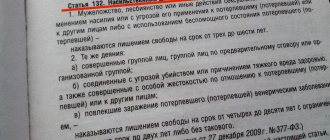1. Infection of another person with a venereal disease by a person who knew about the presence of this disease, -
shall be punishable by a fine in the amount of up to two hundred thousand rubles, or in the amount of the wages or other income of the convicted person for a period of up to eighteen months, or by compulsory labor for a term of up to four hundred and eighty hours, or by corrective labor for a term of up to two years, or by arrest for a term of up to six months.
2. The same act committed against two or more persons or against a minor, -
shall be punishable by a fine in the amount of up to three hundred thousand rubles, or in the amount of the wages or other income of the convicted person for a period of up to two years, or by forced labor for a term of up to five years, or by imprisonment for a term of up to two years.
- Article 120. Coercion to remove human organs or tissues for transplantation
- Article 122. HIV infection
Commentary to Art. 121 of the Criminal Code of the Russian Federation
Infection with a sexually transmitted disease belongs to the group of non-violent crimes against health. The object of the crime is the social relations that arise regarding the realization by a person of the natural right to health and guaranteeing the safety of this good.
The victim of a crime can be any person, including those infected with a venereal disease different from the one with which the perpetrator infected him. The consent of the victim to be infected with a venereal disease is not the basis for releasing the perpetrator from criminal liability (clause 5 of the Resolution of the Plenum of the Supreme Court of the USSR of October 8, 1973 No. 15 “On judicial practice in cases of infection with a venereal disease”), except in cases when reconciliation is achieved between the perpetrator and the victim. The victim is always a different person from the perpetrator. Self-infection with a venereal disease does not entail criminal liability, except in cases where it is a method of committing another crime (for example, provided for in Article 339 of the Criminal Code of the Russian Federation).
———————————
Bulletin of the Supreme Court of the USSR. 1973. N 6.
The objective side of the crime in question is expressed by the act in the form of action or inaction, the consequence in the form of infecting another person with a venereal disease and the causal relationship between them.
Please note that modern medicine does not use the term “venereal disease”. In the list of socially significant diseases approved by Decree of the Government of the Russian Federation of December 1, 2004 N 715 “On approval of the List of socially significant diseases and diseases dangerous to others,” they are called “infections transmitted predominantly sexually,” and their list is determined in accordance with items A50 - A64 of the International Statistical Classification of Diseases and Related Health Problems, 10th Revision (ICD-10). These acts recognize such diseases as: congenital syphilis, early syphilis, late syphilis, other and unspecified forms of syphilis, gonococcal infection, chlamydial lymphogranuloma (venereal), other chlamydial sexually transmitted diseases, chancroid, inguinal granuloma, trichomoniasis, anogenital herpetic viral infection ( herpes simplex), other diseases that are predominantly sexually transmitted, not classified in other sections of ICD-10, sexually transmitted diseases, unspecified.
———————————
NW RF. 2004. N 49. Art. 4916.
Infection with diseases other than those listed, including those that are socially significant and dangerous to others (for example, cholera, leprosy, tuberculosis, etc.), cannot be qualified under Art. 121 of the Criminal Code of the Russian Federation, but depending on the consequences and form of guilt, it may entail criminal liability for causing harm to health under Art. Art. 111, 112, 115, 118 of the Criminal Code of the Russian Federation.
Infection consists of the transmission of pathogens that are predominantly sexually transmitted from the perpetrator to the victim. It seems that in order to qualify the offense under Art. 122 of the Criminal Code of the Russian Federation is enough for the victim to become a carrier of a predominantly sexually transmitted infection, regardless of whether he has developed the corresponding disease.
The method of transmission can be either sexual or domestic (violation of hygienic rules of conduct in the family, at home, at work, etc.). A mandatory characteristic of the method is its non-violent nature. Infection with a venereal disease during rape or sexual assault is qualified under the relevant part of Art. 131 or Art. 132 of the Criminal Code of the Russian Federation; the use of other violence (including beatings) during the infection process requires additional qualification under the relevant articles of the Criminal Code of the Russian Federation, which provide for liability for crimes against health.
Due to the fact that the List of medical indications for artificial termination of pregnancy, approved by Order of the Ministry of Health of Russia dated December 3, 2007 N 736, and the List of social indications for artificial termination of pregnancy, approved by Decree of the Government of the Russian Federation of August 11, 2003 N 485, do not provide for “ venereal" diseases as a basis for abortion, the mother's responsibility for intrauterine infection of the fetus with these diseases under Art. 121 of the Criminal Code of the Russian Federation is excluded.
———————————
Bulletin of normative acts of federal executive authorities. 2008. N 9.
NW RF. 2003. N 33. Art. 3275.
The subjective side of contracting a venereal disease is characterized by guilt in the form of direct or indirect intent or criminal frivolity. The subject is aware of the social danger of infecting another person with a venereal disease, foresees the possibility or inevitability of infection and desires (with direct intent) or consciously allows or is indifferent to the fact of infection (with indirect intent). When committing a crime out of frivolity, the perpetrator foresees the possibility of infecting the victim, but arrogantly hopes to prevent the consequences (for example, uses contraceptives during sexual intercourse). A negligent attitude to the consequences in this crime is excluded, since the knowledge provided by law by the subject that he has a disease already presupposes the possibility of foreseeing infection with the disease of another person.
The motives and purposes of the crime may be different and do not affect qualifications.
The subject of the crime in question is a physically sane person who has reached the age of sixteen, has a sexually transmitted disease and is aware of its presence. The subject is special. To correctly qualify the crime, it is necessary to establish the presence of evidence confirming that the subject reliably knew about his illness. The source of knowledge can be a warning from a medical institution (clause 1 of the Resolution of the Plenum of the Supreme Court of the USSR of October 8, 1973 No. 15 “On judicial practice in cases of infection with a venereal disease”), as well as other data (for example, external manifestations of the disease). At the same time, it seems that, within the meaning of the law, the subject of a crime can also be a carrier of an infection transmitted primarily through sexual contact, in whom the corresponding disease has not yet developed. If the culprit reasonably considered himself healthy (for example, due to the fact that several years had passed since the acute course of the disease, he had undergone a course of treatment, etc.), liability under Art. 121 of the Criminal Code of the Russian Federation is excluded. Actions of persons who are not sick, but who intentionally or through negligence infect other persons with a venereal disease are liable under Art. 121 of the Criminal Code of the Russian Federation do not entail, but depending on the consequences that occur, they can be qualified under articles providing for liability for causing harm to health.
The law recognizes as a qualified crime (Part 2 of Article 121 of the Criminal Code of the Russian Federation) infection with a venereal disease committed in relation to two or more persons or in relation to a known minor.
"Sin of Sodom"
Thinking about the question “Sodomy – what is it?”, you inevitably begin to remember the Bible. And indeed: this word came into the Russian language from Church Slavonic, and specifically from religious law. In it, this term initially meant exclusively anal sex between two men.
A synonym for the term “sodomy” in church law is also the later name “sodomy,” borrowed from European languages. This term is associated with the biblical legend about the city of Sodom, whose inhabitants became famous for such perverted behavior that they even began to pester the angels who came to the city to the only righteous Lot. It should be noted that in the ecclesiastical legal sense, sodomy is not only sodomy, but also all other sexual practices considered vicious from the point of view of the Church (masturbation, oral sex, even extramarital affairs).
Judicial practice under Article 121 of the Criminal Code of the Russian Federation
Resolution of the Plenum of the Supreme Court of the Russian Federation dated May 16, 2017 N 15
19. Administrative supervision in relation to an adult who is released or released from prison and has an unexpunged or unexpunged conviction for committing an intentional crime against a minor can be established only if the specified sign is provided as a sign of a crime (simple or qualified) in the relevant norm of the criminal law (for example, paragraph “d” of part 2 of article 117, part 2 of article 121, part 3 of article 122, paragraph “b” of part 2 of article 127.1, articles 150 - 151.1, 156 of the Criminal Code of the Russian Federation).
Cassation ruling of the Judicial Collegium for Criminal Cases of the Supreme Court of the Russian Federation dated January 15, 2019 N 127-UD18-19
- August 17, 2010 by the Evpatoria City Court under Part 1 of Art. 121 of the Criminal Code of the Republic of Ukraine to 5 years in prison using Art. The Criminal Code of Ukraine is conditional with a probationary period of 3 years; - April 29, 2011 by the Evpatoria City Court under Part 2 of Art. 185, art. Criminal Code of the Republic of Ukraine to 5 years 6 months imprisonment,
Cassation ruling of the Judicial Collegium for Criminal Cases of the Supreme Court of the Russian Federation dated July 18, 2019 N 127-UD19-12
Mogilev Dmitry Evgenievich, ... convicted on October 13, 2003 under Part 4 of Art. 296, part 1 art. 121 of the Criminal Code of Ukraine, on the basis of Part 1 of Art. , Criminal Code of Ukraine to 8 years in prison, released on May 6, 2011 after serving his sentence,
Cassation ruling of the Judicial Collegium for Criminal Cases of the Supreme Court of the Russian Federation dated December 27, 2017 N 127-UDp17-19
Karelin Anatoly Evgenievich, ... convicted on May 25, 2009 under Part 2 of Art. 121, part 2 art. 296, part 3 art. 296, part 4 art. 296 of the Criminal Code of Ukraine, based on Art. Criminal Code of Ukraine to 7 years in prison, released in January 2014 after serving his sentence,
Appeal ruling of the Judicial Collegium for Criminal Cases of the Supreme Court of the Russian Federation dated 02/06/2018 N 47-APU18-1
considered at the court hearing the appeal of lawyer N.E. Sapozhnikova. to the resolution of the Orenburg Regional Court dated November 27, 2021, which decided to extradite to the competent authorities of Ukraine for criminal prosecution under Part 2 of Art. 121 of the Criminal Code of Ukraine
Appeal ruling of the Judicial Collegium for Criminal Cases of the Supreme Court of the Russian Federation dated February 20, 2018 N 127-APU18-1
Kostenko Yuriy Anatolyevich, ... convicted on December 25, 2013 by the Gagarinsky District Court of Sevastopol under Part 1 of Art. 121, part 4 art. Criminal Code to 7 years 6 months imprisonment, released on June 17, 2014 after serving the sentence -
Determination of the Judicial Collegium for Criminal Cases of the Supreme Court of the Russian Federation dated April 18, 2019 N 127-UD19-5
The crime was committed by Piskov A.V. in 2013, during the period of validity of the criminal legislation of Ukraine in Crimea. Criminal liability for intentional grievous bodily injury resulting in the death of the victim was provided for in Part 2 of Art. 121 of the Criminal Code of Ukraine. The sanction of this norm provided for punishment in the form of imprisonment for a term of up to 10 years.
Punishment for sodomy in old Russia
Initially, in Rus' homosexuals were treated rather leniently. There was no criminal punishment for it under secular law, and church punishments were limited to penance for a period of one to seven years - that is, practically the same as for fornication between a man and a woman.
However, over time the situation changed. Under the influence of Western Europe, articles for sodomy appeared in Russian law, providing for severe punishment. The most terrible thing for homosexuals was, perhaps, the reign of Peter I. In the first years under him, there was a rule according to which this crime was punishable by burning (a thing, in general, for the Russian legal tradition, to put it mildly, is uncharacteristic). Later, the punishment was softened: ordinary homosexual contact was punishable by corporal punishment, and those associated with rape - by indefinite exile.
Later, until Nicholas I, punishments were practically not used. However, the “Code” adopted in 1832 (essentially the first Russian criminal code) again contained provisions on liability for sodomy. Now the perpetrators were punished with prison for a period of at least three months, and in special circumstances (violence, sex with a minor) - up to eight years. This punishment was formally in effect until the October Revolution.
Pre-revolutionary law itself did not give a direct answer to the question about sodomy - what it is. However, in court practice, this crime was understood almost exclusively as anal intercourse.
Tolerant USSR?
In the early Soviet years, homosexuality was not prohibited. The old law of the times of the Russian Empire was not in effect, and in the new criminal laws there was no liability.
Moreover, the leadership of the Union even suppressed attempts to introduce punishment for this in the criminal law of individual republics. The USSR of the twenties, not without reason, was considered a model of tolerance for sexual deviations. There was no article for sodomy in the USSR at that time.
Important
As a rule, a detained person is first placed in a Temporary Detention Facility (IVS), and some time after a preventive measure in the form of detention is taken against him, he is transferred to a Pre-trial Detention Facility (SIZO). Sometimes, while the investigation is ongoing, the accused are kept in pre-trial detention center for months together with murderers and so-called “thieves”. Among these persons, Article 132 of the Criminal Code is not respected, which causes conflicts.
Timely involvement of a lawyer is necessary to protect the suspect/accused from violation of his rights (including in a pre-trial detention center), appeal against decisions of the investigator and the court, as well as build the correct legal position on the case before the start of investigative actions (interrogations, confrontations). Lawyer Vyacheslav Vostokov is ready to provide you or your loved one with qualified defense in a criminal case - come for a consultation.
The cost of defending a lawyer under Art. about sexual assault
| Name of the service provided | Service cost |
| Consultation | 5,000 rub. |
| On-site consultation | 7,000 rub. |
| Fixed price for doing business from the beginning | from 40,000 rub. |
| Fixed price of the case when applying during the investigation process | from 60,000 rub. |
| Hourly payed job | 2,000 rub. |
| One-time visit | from 10,000 rub. |
| Studying the case of a client in jail | from 15,000 rub. |
Work for results
The sooner you contact me, the more effective the results of my help will be. I have extensive experience in criminal defense, both at the preliminary investigation stage and in court. In the vast majority of cases, I achieve the planned result. The experience I have developed over the years in legal assistance on a wide range of crime charges - from minor to particularly serious ones - allows me to confidently defend my clients. In addition to my own experience, I also participate in seminars and listen to advanced training lectures, which are conducted jointly with colleagues from the legal community. Feel free to contact me for advice. A criminal case is not yet a verdict!
Qualified defense
The participation in a criminal case of a qualified defense attorney by agreement - lawyer Vyacheslav Vostokov - is a guarantee of developing the correct position against the charges brought. Use the opportunity to regularly receive professional advice on your case, and you will gain a noticeable advantage against the pressure of the investigative authorities, the prosecutor's office and the court. I am carrying out comprehensive work to challenge the prosecution's version. I conduct my own legal investigation, help my client develop a defense version, and collect evidence. My clients, if they end up in a pre-trial detention center, are not left without legal and moral support. I visit the pre-trial detention center and carry out all the necessary work with the client there. My clients feel confident in court.
- I am conducting comprehensive work to challenge the prosecution’s version.
- With my participation, the principal is protected from pressure from law enforcement agencies.
- I comply with the requirements of professional ethics.
Mitigating and aggravating circumstances
Mitigating circumstances include a sincere confession, cooperation with the investigation and repentance for the crime committed. If the offender is the breadwinner of a family with small children, this circumstance may also mitigate the punishment. Actions that aggravate the verdict:
- committed with extreme cruelty;
- causing infection (HIV and sexually transmitted diseases);
- which resulted in death;
- committed by a group of people;
- in relation to a teenager or child.
The participation of a lawyer will allow the charges to be dropped or the punishment reduced. A human rights defender will help you build a correct model of behavior and tell you what comments you need to refuse during the proceedings. Otherwise, every unweighted word will affect the verdict. The lawyer will be present at investigative experiments and hearings, protecting the interests of the client.
Seek help from a defense attorney under Art. You can call 132 using the phone number that is on the page. The advantage of the company is many years of experience and an individual approach. Before starting work, you need to discuss the details and sign the contract. After that, we will do our best to solve your problem.
Abolition of criminal penalties
However, since the 70s, the opinion began to spread in the USSR that criminal penalties for sodomy should be abolished. For example, there is a well-known joke: “Putting a homosexual in prison is the same as sentencing an alcoholic to correctional labor at a distillery.” More seriously, it was argued that the mere immorality of actions should not be considered a crime. However, until the very end of the USSR, responsibility remained.
The situation changed after the collapse of the Union and the declaration of Russian independence. Although in the first years of the existence of the Russian Federation, sodomy was still considered a crime (the old Soviet law was still applied), in 1993 the article was changed. From that moment on, punishment was imposed only for forced sodomy or for sex with a minor.










